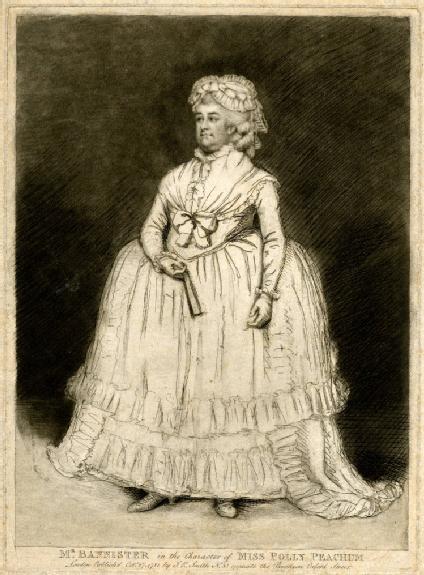EN979: Eighteenth-Century and Romantic Theatre
UPDATED FOR 2014-15
Dr. David Taylor (d.f.taylor@warwick.ac.uk), H5.10
Term 1: Thursdays, 2-4pm
Overview
 This module explores drama between two dates that mark and redefine the powerful and vexed relationship between the state and the stage in Britain: the first is 1737, when the Stage Licensing Act established theatrical censorship; the second is 1832, a year which saw not only the passing of the Reform Act but also an urgent parliamentary enquiry into the standards of playwriting and performance.
This module explores drama between two dates that mark and redefine the powerful and vexed relationship between the state and the stage in Britain: the first is 1737, when the Stage Licensing Act established theatrical censorship; the second is 1832, a year which saw not only the passing of the Reform Act but also an urgent parliamentary enquiry into the standards of playwriting and performance.
Once neglected and even maligned by scholars, this period of theatre history is now recognized as one marked by generic experimentation and, very much entwined with this, the commercialization of culture. Against the backdrop of fundamental socio-economic and geopolitical change - the rapid expansion of the British empire, the onset of industrial modernity, and a series of political revolutions that both channelled and unsettled Enlightenment idealism - the playhouses of London and beyond functioned as key public sites for the staging and negotiation of racial, imperial, and sexual ideologies.
We will begin with case studies of two specific nights at the theatre, in 1807 and 1787 respectively. On the one hand, this will give us the opportunity to think in terms of programmes of entertainment rather than individual plays, to probe the relationship between mainpiece and afterpiece, and to consider the practices and material conditions of performance. On the other hand, in these plays we will see refracted the issues that will structure the rest of the course: from the colonial landscape to slave trade and from capitalism to constructions of gender. Thereafter the designated weekly themes need also to be approached as keywords that will be repeatedly revisited across the course.
Some of the plays we will read – by Gay and Sheridan, for instance – are canonical, but many others are not. Some of them are, by most standards, poorly written or conceived; all, though, were popular with the period’s audiences. One challenge of this course is that we will be reading many of these texts in early printed editions; a second is that the texts under consideration will force us to interrogate cultural distinctions between “literary” and “popular” drama. In doing so, we will also look beyond plays to depictions of theatre and theatricality in novels, poems, and essays of the period.
Course Outline
Week 1. A Night at the Theatre 1 (Drury Lane, 28/12/1807)
George Lillo, The London Merchant (1731)
Furibond; or Harlequin Negro (1807)
Week 2. A Night at the Theatre 2 (Haymarket, 8/8/1787)
George Colman, Inkle and Yarico (1787)
Elizabeth Inchbald, The Mogul Tale (1784)
 Week 3. Satire and Censorship
Week 3. Satire and Censorship
John Gay, The Beggar’s Opera (1728)
Henry Fielding, The Historical Register for the Year 1736 (1737)
Week 4. The Theatre of Empire
R. B. Sheridan, The School for Scandal (1777) and Pizarro (1799)
John O’Keeffe, Omai; or, A Trip Round the World (1785)
Week 5. Women, Work, and the Body
Arthur Murphy, The Grecian Daughter (1772)
Hannah Cowley, The Belle’s Stratagem (1781)
Week 6. At Home with Performance and Spectatorship
Jane Austen, Mansfield Park (1814)
Elizabeth Inchbald (after Kotzebue), Lovers’ Vows (1798)
Week 7. Inventing "Shakespeare"
Samuel Johnson, preface to The Plays of Shakespeare (1765)
David Garrick, Harlequin’s Invasion (1759) and Jubilee Ode on Shakespeare (1769)
Charles Somerset, Shakspeare’s Early Days (1829)
Week 8. The Theatre of Revolution
Excerpt from Edmund Burke, Reflections on the Revolution in France (1790)
M. G. Lewis, The Castle Spectre (1797)
William Hazlitt, "Coriolanus" (1817)
Week 9. “Romantic” theatricality?
Joanna Baillie, De Monfort (1798) and “Introductory Discourse”
William Wordsworth, The Prelude, Book 7 (1805)
Charles Lamb, "On the Tragedies of Shakespeare" (1812)
Week 10. Class, Culture, and Hegemony in 1832
Douglas Jerrold, Rent-Day (1832)
John Walker, The Factory Lad (1832)
Excerpts of Report from the Select Committee on Dramatic Literature (1832)
For detailed list of weekly readings see here.
Texts
Please purchase a copy of Austen's Mansfield Park. I recommend the Oxford World's Classics edition, ed. James Kinsley (2008). All plays and other extracts will be available in a course reader, which you must purchase and costs £30.
Primary texts will be supplemented by additional weekly critical readings. Please see here to view and dowload these.
Select Bibliography
- Backscheider, Paula, Spectacular Politics: Theatrical Power and Mass Culture in Early Modern England (Baltimore: Johns Hopkins University Press, 1993)
- Baer, Marc, Theatre and Disorder in Late Georgian London (Oxford: Oxford University Press, 1992)
- Bolton, Betsy, Women, Nationalism, and the Romantic Stage: Theatre and Politics in Britain, 1780-1800 (Cambridge: Cambridge University Press, 2001)
Conolly, L.W., The Censorship of English Drama 1737-1824 (San Marino: Huntington Library, 1976) - Dobson, Michael, The Making of the National Poet: Shakespeare, Adaptation and Authorship, 1660-1769 (Oxford: Clarendon Press, 1995)
- Freeman, Lisa A., Character's Theater: Genre and Identity on the Eighteenth-Century English Stage (Philadelphia: UPenn Press, 2001)
- Kinservik, Matthew J., Disciplining Satire: The Censorship of Satiric Comedy on the 18th-century London Stage (Lewisberg: Bucknell University Press, 2002)
Moody, Jane, Illegitimate Theatre in London 1770-1840 (Cambridge: Cambridge University Press, 2000)
________ and Daniel O'Quinn (eds.), The Cambridge Companion to British Theatre, 1730-1830 (Cambridge: Cambridge University Press, 2008) - Nussbaum, Felicity A., Rival Queens: Actresses, Performance, and the Eighteenth-century British Theater (Philadelphia: University of Pennsylvannia Press, 2013)
- O'Brien, John, Harlequin Britain: Pantomime and Entertainment, 1690-1760 (Baltimore: Johns Hopkins University Press, 2004)
- O'Quinn, Daniel, Staging Governance: Theatrical Imperialism in London, 1770-1800 (Baltimore: Johns Hopkins University Press, 2005)
- ________, Entertaining Crisis in the Atlantic Imperium, 1770-1790 (Baltimore: John Hopkins University, 2011)
- Pascoe, Judith, Romantic Theatricality: Gender, Poetry, and Spectatorship (Ithaca and London: Cornell University Press, 1997)
- Russell, Gillian, Women, Sociability and Theatre in Georgian London (Cambridge: Cambridge University Press, 2010)
Swindells, Julia, Glorious Causes: The Grand Theatre of Political Change, 1789 to 1833 (Oxford: Oxford University Press, 2001).
- ________ and David Francis Taylor (eds.), The Oxford Handbook of the Georgian Theatre, 1737-1832 (Oxford: Oxford University Press, 2014)
- Taylor, David Francis, Theatres of Opposition: Empire, Revolution, and Richard Brinsley Sheridan (Oxford: Oxford University Press, 2012)
- Thomas, David (ed.), Theatre in Europe: A Documentary History, Restoration and Georgian England 1660-1788 (Cambridge: Cambridge University Press, 1989)
